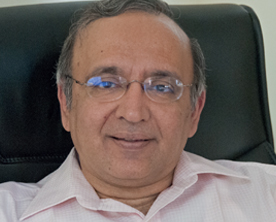Name: Sunil Seth
Nationality: Indian
Age: 53
Company: Tata International
Position: Country Head
Profession: Mechanical Engineer and MBA.
Sunil has been with the Tata Group for more than 30 years, spending more than 28 of those years with Tata Steel. Sunil’s area of interest and expertise has been the marketing and sale of steel and international trading and he has spent fifty percent of his career working outside of India, having worked in Slovakia, Thailand, Singapore and now Myanmar. One of his main contributions to the Group includes the successful launch of the Tata Tiscon brand of reinforced steel bars in both India and Thailand.
The Myanmar Insider: When was the first time you visited Myanmar?
Sunil Seth: I visited Myanmar first when I was posted in Singapore. It was in 1996 while I was working as a regional manager for exports. I was looking into exporting steel bars to Myanmar at that time from India, Russia and Turkey.
MI: What was your experience of the country like back then?
SS: The market had not evolved as yet compared to other ASEAN markets, even though it had its own unique characteristics, even way back in 1996. I noticed significant limitations in banking facilities and a lack of awareness on quality. At the same time, businessmen were very open to engaging with the outside world. They did bargain hard, but once the terms were agreed, they would honour the contracts. I also experienced difficulties in shipping to Yangon port, as the port was very congested in those days.
MI: What are your impressions of the country now, and what do you see in its future?
SS: During my visit in 2011, I was pleasantly surprised by the improvement of internet facilities, mobile phones and roaming facilities. Of course, now the access is even better. I eventually took the position of Country Head for Tata International on the 1st of January, 2013.
I saw a huge increase in the number of cars on roads in Yangon and an improved banking system; the currency has been floated. Myanmar has very good potential; its demographics are extremely favourable: it has a hardworking, intelligent and adaptive young population. Myanmar people are fast learners and they are very comfortable with technology. In addition, the country is blessed with natural resources and a strategic geographical location. We just need patience, perseverance and time to develop relationships and trust here.
MI: How did you end up stationed full time in Myanmar?
SS: The Tata Group has been looking for opportunities in Myanmar for a while. Tata Motors has built an assembly plant in Magwe Division in partnership with the Ministry of Industry. With my regional experience within ASEAN, I was selected to be the country head for Myanmar, having, as I said earlier, worked for Tata Steel in Singapore and Thailand. I personally wanted to develop other businesses for the Group besides steel.
MI: How does working in Myanmar under the present business climate compare with other Asian countries?
SS: It has been a unique experience for me. The facilities that you take for granted in other countries are not easily available here, for example, proper infrastructure, domestic travelling, power supply and banking facilities. So, one has to be adaptive and flexible to do business in these circumstances.
MI: What, if any, are the challenges with the local workforce? If there is a problem, what would your solution be?
SS: The younger generation is hard working and sincere. Of course, we do need them to be exposed to best practices from around the world. They are fast learners, so given proper training, investment and time, they will come up really fast. Being able to understand English well and to be able to speak it is also a plus, in addition to being technology savvy. The short comings would be the lack of awareness in the concept of loyalty and a lack of initiative. They are good at implementation, but they will wait until the boss tells them what to do.
MI: What does doing business in Myanmar now offer most for your company?
SS: We have many SBUs (strategic business units) within the Tata Group: steel, power, construction, housing, trading, hotels, chemicals, agro and automotive. Each SBU sees an opportunity in Myanmar. Myanmar needs good infrastructure, good hotels, agro investments and reliable trading partners.
MI: Which sectors do you believe offer the most in terms of business opportunities in Myanmar, and why?
SS: My first choice would be power generation. Only 26 percent of the country’s population has access to power. Next would be infrastructure development; the country still needs lots of bridges, roads and housing. The third would be agro business. Under the brand Rallis India, we produce the “cides” (insecticides, fungicides, pesticides, etc.), food nutrients and seeds. We want to market our products, increase productivity and yields and buy back the agro produce for exports.
MI: What effect do you think the sudden influx of foreign companies/nationals will have on the country and its people/culture?
SS: I see this from a positive viewpoint. The foreign companies would offer excellent job opportunities. One of the important side effects of this would be getting an upgrade of workers’ skills and knowledge, either through their own efforts or the company’s training programmes. Local workers will also experience international best practices being deployed here by multinationals. There will also be competition amongst local staff to get the best jobs.
MI: If anything could be introduced quickly – say over the next six months – to improve doing business here, what measure(s) would you implement? Conversely, what long term changes are key to development that need to be implemented now?
SS: I believe government needs to prioritise and focus. They have to understand that they cannot do all the improvements that they want to do at the same time, so it is best to prioritise things, such as infrastructure development, and stay focused on these. Also, the government can help shorten the lead time to get projects approved and implemented, for example, having a standard Power Purchase Agreement in place quickly as an example for power sector development. Another important thing would be clearly stated and unambiguous laws and regulations. A number of foreign investors are hesitant to invest because of non clarity of the legal framework.
MI: Are there any other risks that you see for the economy?
SS: Myanmar is currently getting a lot of attention from the global community. Global organizations, such as the World Bank, the Asian Development .










